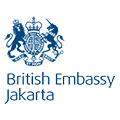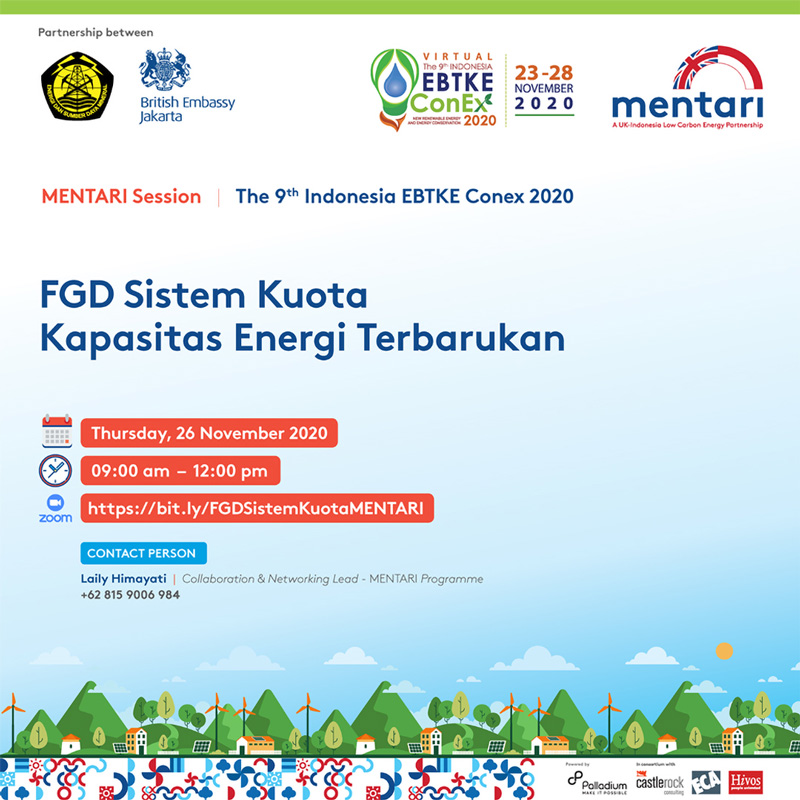MENTARI Exploring A Method Approach of Indonesia's Renewable Energy Capacity Quota System
Jakarta, 26th November 2020- The Program of MENTARI (Towards a Low Carbon Energy Transition in Indonesia) provides technical assistance in creating and compiling guidelines related to the capacity quota system for New and Renewable Energy (EBT) which is more comprehensive, following the draft Presidential Regulation (Perpres) which will regulate auction rates, tenders, and government support or mandate in terms of intensifying EBT developments.
“At the level of Perpres, there is a derivative of regulation on determining the capacity of the EBT quota. The MENTARI program has started an assessment of its methods, so that the capacity quota can be applied in a structured manner,” explained Muhammad Suhud, Policy Lead for MENTARI project during the opening of a virtual Focusing Group Discussion (FGD) on Renewable Energy Capacity Quota System, Thursday (26/11). This event was part of MENTARI’s contribution and participation at The 9th Indonesia EBTKE Virtual Conference and Exhibition 2020 occurred on 23 – 28 November 2020.
Meanwhile Harris Yahya, Director for Various of New and Renewable Energy at Ministry of Energy and Mineral Resources (MEMR), greatly appreciated the support of the United Kingdom (UK) government through the MENTARI program which also provides technical assistance related to the EBT quota system. He revealed the fact that the EBT target is 23%, currently it has only reached 10.9%. It means that Indonesia needs to accelerate up to 12% to reach the 23% of EBT target by 2023.
“The remaining time is approximately 4 – 5 years. The current power plant position is managed using “the business as usual method” during those years it would be less visible to reach the 23% of EBT target, In 2025 we will need additional 10 – 14,000 Megawatt. What can we do to accelerate EBT for this? Therefore we need to think of a generator that can be built immediately, one of them is Solar Power Plant (PLTS), for example. We need to accelerate it,” stated him during the opening of FGD.
In the explanation of the methodology study, the determination of the EBT capacity quota in this FGD is explained directly by MENTARI’s Policy Associate, I Made Ro Sakhya and Aloysius Damar Pranadi, by categorizing several approaches that have been carried out by various other countries, to be precise the certification system and zone.
“For certification it is usually known as Renewable Energy Certificate, in UK it is called as Renewable Energy Obligation – It is mandatory to be achieved and there are penalties if they are not met the requirements. Certifications are required and are traded. While, the zone quota system refers to targets that require to be achieved collectively. This target is applied as the Renewable Energy reference target. The implementation is performed by utilities and the local governments. This zone quota system has been implemented in China, Italy, Malaysia and even Indonesia. There is no certification, auction, and other things,” explained Damar when starting the discussion.
From the study, Damar and Made propose a preference for Indonesia by applying the Zone system as has been conducted previously, because it simplifies its integration with state-owned electricity company (PLN) Electricity Procurement Plan (RUPTL), and the design of the incentives can be perceived from the derivatives of the Perpres related to tariffs, auctions and pricing.
Meanwhile Made also explained the type of quota for EBT, which can be used as the next preference is the Dispatchable Quota which are considered to be able to provide definite capacity, and relatively has sufficient power when needed. If it goes into system planning, according to Wayan again, it will provide longer certainty.
“One of the characteristics is highly dependent on natural conditions but is easier to calculate. For example micro hydro, if there is a dam, we can adjust the available water capacity as well as when the water can be used whether it is high or low, and it will improve the economy holistically. Meanwhile, the non-dispatchable – what is most feared is intermittency – for example, if there are clouds or something else causing regular changes in variability, added Made.
In the presentation of the MENTARI study, the experts were invited to provide reviews and inputs, they were Nanang Hariyanto, Head of the Electrical Power System and Distribution Laboratory of School of Electrical Engineering and Informatics (STEI) – Bandung Institute of Technology (ITB); Djoko Prasetijo as a member of Indonesian Electrical Society (MKI) and former Commissioner of PLN Engineering and Director of System Planning; and Musa Marbun of PLN’s System Planning Division.
In his input notes, Nanang said the study conducted by MENTARI was quite interesting, currently with the existence of EBT, loads and generators in Indonesia can be varied, but then the transition process from conventional to EBT is a challenge in itself. Nanang also highlighted the issue of quota flexibility if it is implemented. Particularly, when measuring intermittency and variability associated with zones or regions. Including connecting the network if it has to be connected between islands throughout Indonesia.
Meanwhile, Djoko Prasetijo would like to clarify again what is the basis for determining the quota. Since in his mind the application of quotas means a limitation, while if there is a need for a region to want more quota, he is not sure that PLN will provide it.
“Funding is also important. For example, in other countries, their government will guarantee if there is a loss. Their House of Representatives (DPR) will issue Renewable Energy Fund, therefore it becomes the basis for determining the quota. MENTARI needs to take it as a consideration, it can also be included in the guidance that will be created later, he mentioned.
Meanwhile, Muda Marbun reminded about uncertain systems that occur in the field and are often faced by PLN.
“The configuration can change. Java-Bali during the night is different. Another thing is about contract flexibility. It could be that all the infrastructure is ready, but whether the diesel-fired power plants (PLTD) is also ready, because they are also bound by contracts, “ he said.
It is planned that MENTARI will include recommendations from experts and FGD participants in this event and will refine them in the next FGD. MENTARI program is exist as a four-year partnership program between two countries. It is coordinated by the British Embassy in Jakarta and its partners, the Ministry of Energy and Mineral Resources of Indonesia as a main counterpart. The program aims to deliver inclusive economic growth, poverty reduction, accelerate the ratio of electricity access, and reduce the impact of climate change in Indonesia. Related to the program MENTARI will assist Indonesian government in developing the low-carbon energy sector, especially providing electricity access in eastern Indonesia using EBT. (Musfarayani/MENTARI)







